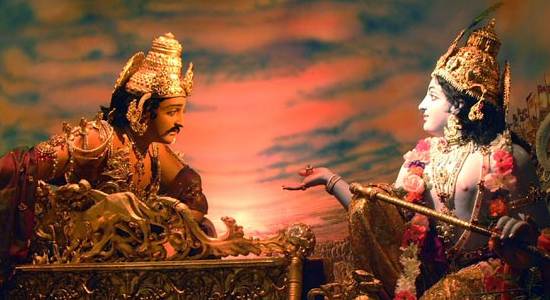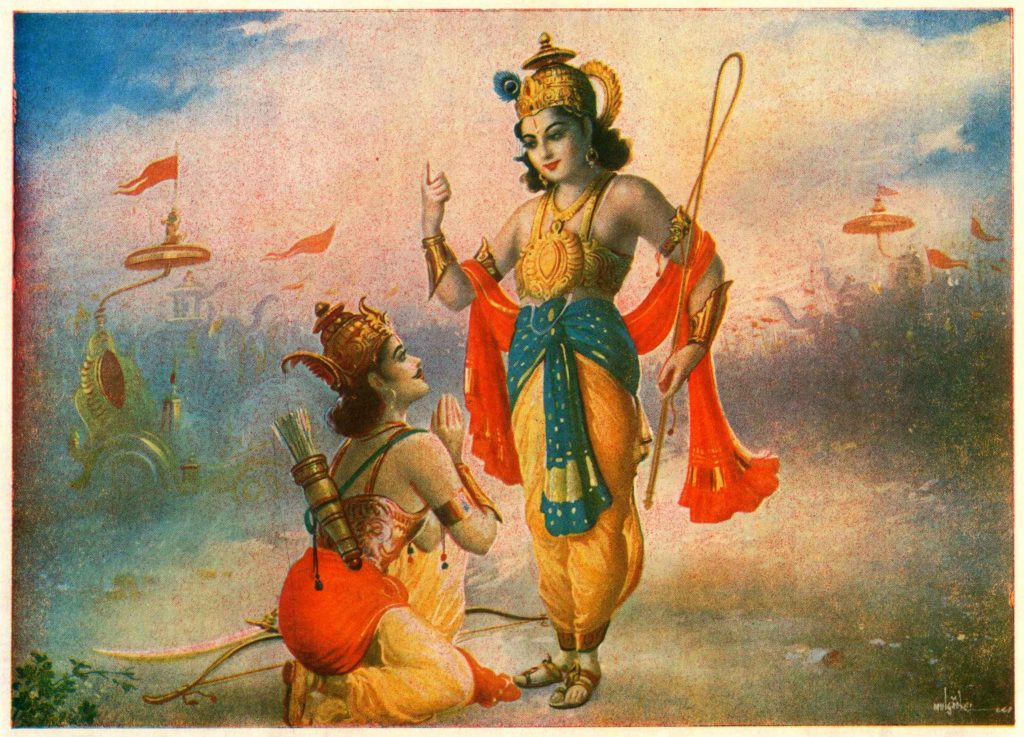It’s been a while since I had the chance to continue writing about the Gita. I’ve been caught up in the responsibilities of adult life, including work, personal matters, health concerns, and my dance pursuits. Nevertheless, I’m excited to be back and share more insights with you all as I delve deep in to the Sacred Gita. Thank you all for all your love and blessings all these years! <3
Chapter 3, Verse 22 (Sanskrit):Sanskrit Verse: न मे पार्थास्ति कर्तव्यं त्रिषु लोकेषु किंचन। नानवाप्तमवाप्तव्यं वर्त एव च कर्मणि।।3.22।।
na me pārthāsti kartavyaṁ triṣhu lokeṣhu kiñchana nānavāptam avāptavyaṁ varta eva cha karmaṇi
O Partha (Arjuna), there is nothing that I must do in the three worlds, nothing for Me to gain or attain. Yet, I am engaged in prescribed duties.
Commentary for Chapter 3, verse 22: In this verse, Lord Krishna addresses Arjuna as Partha and highlights His divine nature. He emphatically declares that, as the Supreme Being, He has no needs, desires, or achievements to pursue within this entire universe. Nevertheless, out of His boundless love and compassion for all living beings, Lord Krishna willingly embraces his prescribed duties to serve as a guiding example for others.
As the Supreme Being, Lord Krishna exercises absolute control over the entire universe, having nothing to gain. However, He performs His prescribed duties solely driven by selfless love and the greater good of the world.
This reinforces the profound concept of selfless action, underscoring the vital importance of fulfilling one’s responsibilities without attachment to the outcomes.
Chapter 3, Verse 23 (Sanskrit):Sanskrit Verse: यदि ह्यहं न वर्तेयं जातु कर्मण्यतन्द्रितः। मम वर्त्मानुवर्तन्ते मनुष्याः पार्थ सर्वशः।।3.23।।
yadi hyahaṁ na varteyaṁ jātu karmanyatandritaḥ mama vartmānuvartante manuṣhyāḥ pārtha sarvaśhaḥ
For if ever I did not perform prescribed duties, O Partha (Arjuna), all men would follow My path in all respects.

Commentary for Chapter 3, verse 23:
Lord Krishna continues to illustrate His role as a divine leader. He emphasizes that if He were to abstain from His prescribed duties, it could result in confusion among human beings. We often emulate the actions of great personalities, and if the Supreme Being were to cease His activities, it might lead to chaos and people abandoning their responsibilities – their swadharma. Therefore, as a divine leader, Krishna dutifully fulfills His responsibilities, setting a model for righteous living, even though He has no needs, unlike us mortal beings.
It’s important to note that Lord Krishna was born as the son of King Vasudeva of the Vrishni dynasty. If Krishna were to cease His activities and remain idle, doing nothing, it would likely confuse the people and establish an undesirable precedent. People tend to follow the example set by their leaders, and in this case, idleness could lead them down the wrong path.
Even God Himself engages in certain actions not for His own benefit but to guide His followers along the right path. His actions serve as a beacon of righteousness, ensuring the well-being and spiritual growth of His devotees.
Chapter 3, Verse 24 (Sanskrit):Sanskrit Verse: उत्सीदेयुरिमे लोका न कुर्यां कर्म चेदहम्। सङ्करस्य च कर्ता स्यामुपहन्यामिमाः प्रजाः।।3.24।।
utsīdeyur ime lokā na kuryāṁ karma ched aham saṅkarasya cha kartā syām upahanyām imāḥ prajāḥ
If I ever failed to engage in prescribed duties, O Arjuna, certainly these worlds would be put into ruin, and I would become the cause of chaos among all living beings.
Commentary for Chapter 3, verse 24: In this verse, Lord Krishna underscores the significance of adhering to one’s prescribed duties – swadharma. He explains that if He, as the Supreme Being, were to neglect His duties, it could disrupt the natural order, leading to chaos in the world. People often emulate the actions of great personalities, and if the Supreme Being were to set an example by refraining from His duties, others may follow suit, deviating from their own dharma or responsibilities.
Once again, Lord Krishna emphasizes the importance of adhering to one’s swadharma—the responsibilities and duties assigned to each of us. These duties are essential for maintaining the proper functioning of the world, ensuring harmony and balance in society.
Chapter 3, Verse 25 (Sanskrit):Sanskrit Verse: सक्ताः कर्मण्यविद्वांसो यथा कुर्वन्ति भारत। कुर्याद्विद्वांस्तथासक्तश्चिकीर्षुर्लोकसङ्ग्रहम्।।3.25।।
saktāḥ karmaṇy avidvāṁso yathā kurvanti bhārata kuryād vidvān stathāsaktaśh chikīrṣhur loka-saṅgraham
As the ignorant act with attachment to their duties, O Bharata (Arjuna), so should the wise act without attachment, desiring the welfare of the world.
Commentary for Chapter 3, verse 25: In this verse, Lord Krishna distinguishes between the actions of the ignorant and those of the wise. The term “ignorant” here refers to those who haven’t comprehended the fundamental purpose of life, which is self-realization or atma-tatva. They perform every action with the intention of gaining something—whether it’s recognition, fame, money, or respect.
On the other hand, the wise are those who have attained atma-tatva and transcended selfish motives. They’ve realized that the entire world is maya, an illusion, and that the “I” is the atma, the soul, which cannot be destroyed even by the gods.
So, the ignorant perform their duties with attachment, seeking personal gain and recognition. In contrast, the wise fulfill their responsibilities without attachment to the results, driven by a selfless desire for the welfare and betterment of society. This underscores the profound importance of selfless service and the role of the enlightened in guiding others toward virtuous actions. Through such selfless service, your actions will not generate karmic consequences.
Lord Krishna encourages the wise to continue performing their duties for the betterment of society. This principle is exemplified by many enlightened Gurus of recent times, such as Shri Adi Shankaracharya and Sri Ramana Maharshi. Although they have no personal need to act, they actively engaged in noble causes to benefit society at large.

Chapter 3, Verse 26 (Sanskrit): न बुद्धिभेदं जनयेदज्ञानां कर्मसङ्गिनाम्। जोषयेत्सर्वकर्माणि विद्वान्युक्तः समाचरन्।।3.26।।
na buddhi-bhedaṁ janayed ajñānāṁ karma-saṅginām joṣhayet sarva-karmāṇi vidvān yuktaḥ samācharan
The wise should not create discord in the minds of ignorant people who are attached to the fruits of their actions. Instead, by performing their own duties in a disciplined manner, they should inspire others to do the same.
Commentary:
In this verse, Lord Krishna advises the wise not to disturb the minds of those who are ignorant and attached to the results of their actions. Instead of criticizing or causing confusion, the wise should lead by example. They should fulfill their own responsibilities with discipline and devotion, serving as an inspiration for others to follow.
The wise should impart their knowledge to the ignorant according to the spiritual growth of that person, as those who have not realized their atma-tattva do not possess the mental purity required to comprehend knowledge beyond their current state.
This verse is particularly relevant in today’s world, where many individuals pretend to be spiritual masters but lack control over their selfish minds. Their actions, including their spiritual pursuits, are often driven by a desire for wealth and fame. Some even claim enlightenment and cease all activities, becoming complacent and lazy.
Chapter 3, Verse 27 (Sanskrit): प्रकृतेः क्रियमाणानि गुणैः कर्माणि सर्वशः। अहङ्कारविमूढात्मा कर्ताहमिति मन्यते।।3.27।।
prakṛiteḥ kriyamāṇāni guṇaiḥ karmāṇi sarvaśhaḥ ahaṅkāra-vimūḍhātmā kartāham iti manyate
All actions are carried out by the modes of material nature, but the deluded soul, due to false ego, thinks themselves to be the doer.
Commentary for Chapter 3, verse 27: This verse highlights karma (action) and the impact of the three modes of material nature (gunas) – goodness (sattva), passion (rajas), and ignorance (tamas) – on human behavior. We often mistakenly identify ourselves as the sole agents of our actions due to our false ego (ahaṅkāra), which leads to attachment and suffering.
All actions are guided by the gunas, and these gunas are experienced through the mind and our senses. Ignorant individuals, who believe themselves to be their bodies, ans have no control over their mind and senses, wrongly perceive themselves as the exclusive doers of their actions. They superimpose their senses over the true self, driven by desires and attachments.
In contrast, the wise understand that all actions result from the interplay of the gunas and material nature and are influenced by our minds. Only those who have mastered their minds can transcend the influence of the gunas on their actions. They perform their duties selflessly, free from desires and attachments, recognizing that the gunas shape all of material existence.
Chapter 3, Verse 28 (Sanskrit): तत्त्ववित्तु महाबाहो गुणकर्मविभागयोः। गुणागुणेṣु वर्तन्त इति मत्वा न सज्जते।।3.28।।
tattva-vit tu mahā-bāho guṇa-karma-vibhāgayoḥ guṇāguṇeṣhu vartanta iti matvā na sajjate
But those who are true knowers of the truth, O mighty-armed Arjuna, see that the modes (gunas) are performing all actions, and that they are distinct from the modes. Such individuals do not become entangled in the reactions of the modes.
advertisement
Commentary for Chapter 3, verse 28: Here, Lord Krishna distinguishes between those with true knowledge and those who are deluded. True knowers of reality, understanding that they are the atma, recognize that the modes of material nature (gunas) govern all actions. They maintain a distinct identity from these modes, granting them a higher perspective that helps them avoid entanglement in the consequences and attachments associated with material actions.
Regarding the three gunas or modes of material nature – sattva (goodness), rajas (passion), and tamas (ignorance) – individuals blinded by false ego and bewildered by material nature mistakenly believe themselves to be the sole cause of all their actions. In the previous verse, “ahankara” refers to being bewildered by ego identification, such as misidentifying the body as the atma or soul. Such individuals, in their erroneous belief that the interactions of the three gunas within the physical body constitute the actions of the atma, foolishly assume themselves to be the sole doers of their actions.
However, the those who knows the truth that they are atma (those who are self realized) possesses the ability to discern the properties and influences of the three gunas as they manifest in all activities. Becoming proficient in recognizing the manifestation of the three gunas in all actions prevents the error of thinking that they, through their bodies, are the sole doers.
Chapter 3, Verse 29 (Sanskrit):
प्रकृतेर्गुणसम्मूढा: सज्जन्ते गुणकर्मसु। तानकृत्स्नविदो मन्दान्कृत्स्नविन्न विचालयेत्।।3.29।।
English Transliteration: prakṛter guṇa-sammūḍhāḥ sajjante guṇa-karmasu tān akṛtsna-vido mandān kṛtsna-vinna vicālayet
English Translation: Bewildered by the qualities of nature, the ignorant become attached to the actions of the gunas. But the wise, who understand these truths, should not unsettle the foolish, who do not know any better.
Commentary:
In this verse, Lord Krishna explains that those who are ignorant of the influence of the gunas become attached to their actions, erroneously perceiving themselves as the sole doers, as we observed in the previous verse. The wise, on the other hand, understanding the workings of the gunas, should refrain from unsettling the understanding of the ignorant and confusing them.
This verse underscores the significance of compassion and patience in imparting spiritual knowledge. The wise should share their wisdom gently, without disrupting the beliefs of those who are not yet prepared to comprehend these profound truths.
The idea is not to help those lacking self-knowledge, but rather to avoid imposing concepts beyond their current capacity for comprehension. Instead, the wise should convey the knowledge that through selfless performance of swadharma, the ignorant can elevate their spiritual understanding, eventually reaching a point where they are receptive to higher wisdom and self-realization.
Chapter 3, Verse 30 (Sanskrit):Sanskrit Verse: मयि सर्वाणि कर्माणि संन्यस्याध्यात्मचेतसा। निराशीर्निर्ममो भूत्वा युध्यस्व विगतज्वरः।।3.30।।
mayi sarvāṇi karmāṇi sannyasyādhyātma-cetasa nirāśhīr nirmamo bhūtvā yudhyasva vigata-jvaraḥ
Renouncing all actions into Me with a mind centered on the Self, being free from desire and ego, and without any sense of possession, fight, O Arjuna, free from all selfishness and desires.
Commentary for Chapter 3, verse 30: In this verse, Lord Krishna imparts essential wisdom on the path to spiritual realization and selfless action.
Lord Krishna encourages Arjuna and all seekers to surrender all actions to the Divine. This surrender is not just physical but at the level of consciousness. It involves recognizing that all actions ultimately align with the divine cosmic order (God) and acting in harmony with this realization.
As we’ve seen, even those on the path of jnana yoga or spiritual knowledge should engage in swadharma. However, for Arjuna has not attained atma-tatva (self realization), so his duty is to perform his swadharma as a Kshatriya warrior and fight this dharma yudh – the battle of righteousness.
The term sannyasa means renunciation. But what should be renounced? Lord Krishna instructs Arjuna to renounce all actions for himself and instead dedicate all his actions as yagna, a form of worship and offering to the Supreme Lord. One should strive to be guided by the Lord in every action, recognizing divine guidance at all times.
Many of us tend to believe that sannyasa is about relinquishing all our duties and responsibilities simply because we wish to avoid them. In today’s world, we encounter numerous individuals who shirk their responsibilities and label themselves as sannyasis. If we persist in deceiving ourselves in this manner, we will remain trapped in a perpetual cycle of suffering, the very suffering we are earnestly striving to break free from.
By letting go of desires and attachments, and by shedding the ego’s sense of “I” and “mine,” one should joyfully carry out all actions for the satisfaction of the Supreme Lord. In this way, Lord Krishna guides Arjuna to liberate himself from delusion, fight without lamentation, and fulfill his duties.
We will continue from verse 22 in the next part.
ॐ पूर्णमदः पूर्णमिदं पूर्णात्पुर्णमुदच्यते
पूर्णस्य पूर्णमादाय पूर्णमेवावशिष्यते ॥
ॐ शान्तिः शान्तिः शान्तिः ॥
Om Puurnnam-Adah Puurnnam-Idam Puurnnaat-Purnnam-Udacyate
Puurnnasya Puurnnam-Aadaaya Puurnnam-Eva-Avashissyate ||
Om Shaantih Shaantih Shaantih ||
My Pranams to you!


